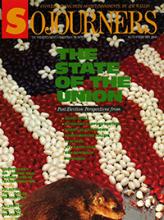On Inauguration Day, George Bush has the opportunity to tell the American public what he thinks it means to have been elected president. That speech, and the annual State of the Union address that occurs in January, provide an analysis of the condition of the country from the administration's perspective.
Many people--campaign officials, political commentators, activists, and average citizens alike--have also been assembling their thoughts about the impact of the 1988 presidential election on the future. We decided to ask a few of these friends to share with us their own perspectives on who and what won and lost on Tuesday, November 8. We offer their analysis of the condition of the country in our version of a collective State of the Union address.
--The Editors
LOOK AT IT THIS WAY--FOUR MORE YEARS OF JOB security," said a woman who works in a shelter for homeless people. The words were shared at a retreat for peacemakers from all over the country two days after the election. We laughed--but only, perhaps, to keep from crying. None of us was going to be lacking for work any time soon.
Half the U.S. electorate chose not to vote in the 1988 presidential election. Some were simply disgusted by the dirt and trash on the campaign trail; others felt the outcome would make little difference. I am sympathetic to both feelings. Through 11 years of living in Washington, D.C., I have seen the arms race escalate, watched U.S. military interventions around the globe, and witnessed the suffering of my neighbors in our inner-city neighborhood--under both Republican and Democratic administrations.
Read the Full Article

